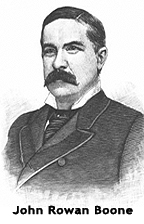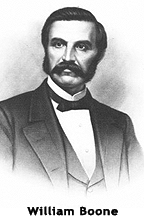|
Boone-founded 28th Kentucky Infantry
saw important action throughout war
By BRYAN BUSH
Bugle Staff Writer
Union Col. William P. Boone and his son, Col. John Rowan Boone, formed and led the 28th Kentucky Infantry in some of the bloodiest campaigns of the Civil War.
The 28th, under their leadership, saw action in Tennessee, Georgia, Alabama, Louisiana and Texas. From 1861 until being mustered out in January 1866, the regiment lost a total of 112 men during the war.
Some of the key engagements were in Munfordville, Atlanta, Resaca, Kennesaw Mountain, Franklin and Nashville.
  William Boone was born on Oct. 12, 1813 in Boone Township, Harrison County, Ind. His father was Col. Samuel Boone and his grandfather was a first cousin to Daniel Boone. William Boone was born on Oct. 12, 1813 in Boone Township, Harrison County, Ind. His father was Col. Samuel Boone and his grandfather was a first cousin to Daniel Boone.
When he turned 17, William studied law under Judge William A. Porter, who was the leading lawyer in Indiana. In 1836, William was licensed to practice law and became a partner with Judge Porter.
William Boone gained the attention of W. P. Thomasson of Louisville and Thomasson asked Boone to enter into a partnership with him in Louisville in the firm of Thomasson and Boone. Thomasson returned to Congress and the firm dissolved, but Boone and his relative, Charles Pennebaker, formed a partnership as Boone and Pennebaker.
John Rowan Boone, William’s son, attended Louisville schools, and in 1861, was a student at Indiana University in Bloomington.
In early 1861, Boone and Pennebaker were elected as Union candidates to the Kentucky legislature and William also recruited Home Guards for the defense of Louisville. Some of these companies went into Camp Joe Holt across the river in Indiana, while others remained in Louisville and did not go into the U.S. service until the days of neutrality were passed.
Col. Boone commanded the companies belonging to the west end of Louisville and Col. Curran Pope commanded those in the east end of the city. In June 1861, John Boone quit Indiana University and joined the “Boone Guards” and became a lieutenant in the company. When the Confederates invaded Kentucky and captured Bowling Green in September 1861, Union Gen. Lovell Harrison Rousseau led the companies from Louisville to Muldraugh’s Hill, where they remained several days before returning to Louisville.
Upon return of the Home Guards, Col. Boone was authorized to raise a regiment for the United States. Nearly the whole six or seven Home Guard companies enlisted under Col. Boone and other men of Louisville joined with them and the 28th Kentucky Infantry was born. John Rowan Boone, son of the Colonel, also joined the 28th Kentucky.
Around Oct. 1, 1861, the 28th obtained tents and went into camp at Shepherdsville. In December, it moved to New Haven. In 1862, the 28th Kentucky protected the Louisville and Nashville railroad and in June four companies were on the Lebanon Branch and other companies were at Bowling Green and Franklin.
The regiment was assigned to Dumont’s brigade, Union Gen. Don Carlos Buell’s army. In July, two companies with Col. Boone were at Gallatin, Tenn., and were scattered all along the railroad with 120 men. Confederate Gen. John Hunt Morgan captured Col. Boone and burned the railroad at Gallatin.
Boone was exchanged and, after an investigation, was absolved from any blame and rejoined his command at Clarksville, Tenn.
While at Clarksville and Columbia, Tenn., the 28th became mounted by orders of Gen. William Rosecrans. The 28th did continuous duty around the state of Tennessee and engaged the Confederates in many small skirmishes. The regiment served with Rosecrans’ army in all their operations up to and including the Battle of Chickamauga in September 1863.
On Dec. 23, 1863, Union Gen. George Thomas, Gen. W. C. Whittaker and Kentucky Gov. Thomas Bramlette obtained a commission of lieutenant colonel for John Boone. Col. William Boone became commander of a brigade comprised of the 3rd and 5th Kentucky cavalry, 4th Michigan cavalry and the 28th Kentucky Mounted Infantry. The 28th then was mounted and armed with the Spencer repeating rifle.
When the 28th Kentucky was mustered out in 1866, William Boone resigned from the army due to poor health and returned to Louisville to his wife and two young children and his business affairs. After the war, he was elected to the Charter Convention of 1870.
He had regained his health, but in January 1875, he was caught in a rain storm, caught Typhoid pneumonia and died on Jan. 24, 1875. His body was taken to Louisville’s Cave Hill Cemetery.
William Boone was married to Eliza Harney, whose mother was a daughter of Judge John Rowan, a distinguished layer and statesman who owned Federal Hill in Bardstown, which later became My Old Kentucky Home state park.
After the war, John Boone studied law and in 1869, he began practice as a junior in the law firm of Boone and Boone. When his father died, John took over control of the firm.
In 1870, Boone married Carrie Bell Morris, the daughter of George W. Morris, a prominent citizen and merchant of Louisville. John and Carrie had seven children. John Rowan Boone died Nov. 28, 1883 and was buried in the same family plot as his father in Cave Hill Cemetery.
|



